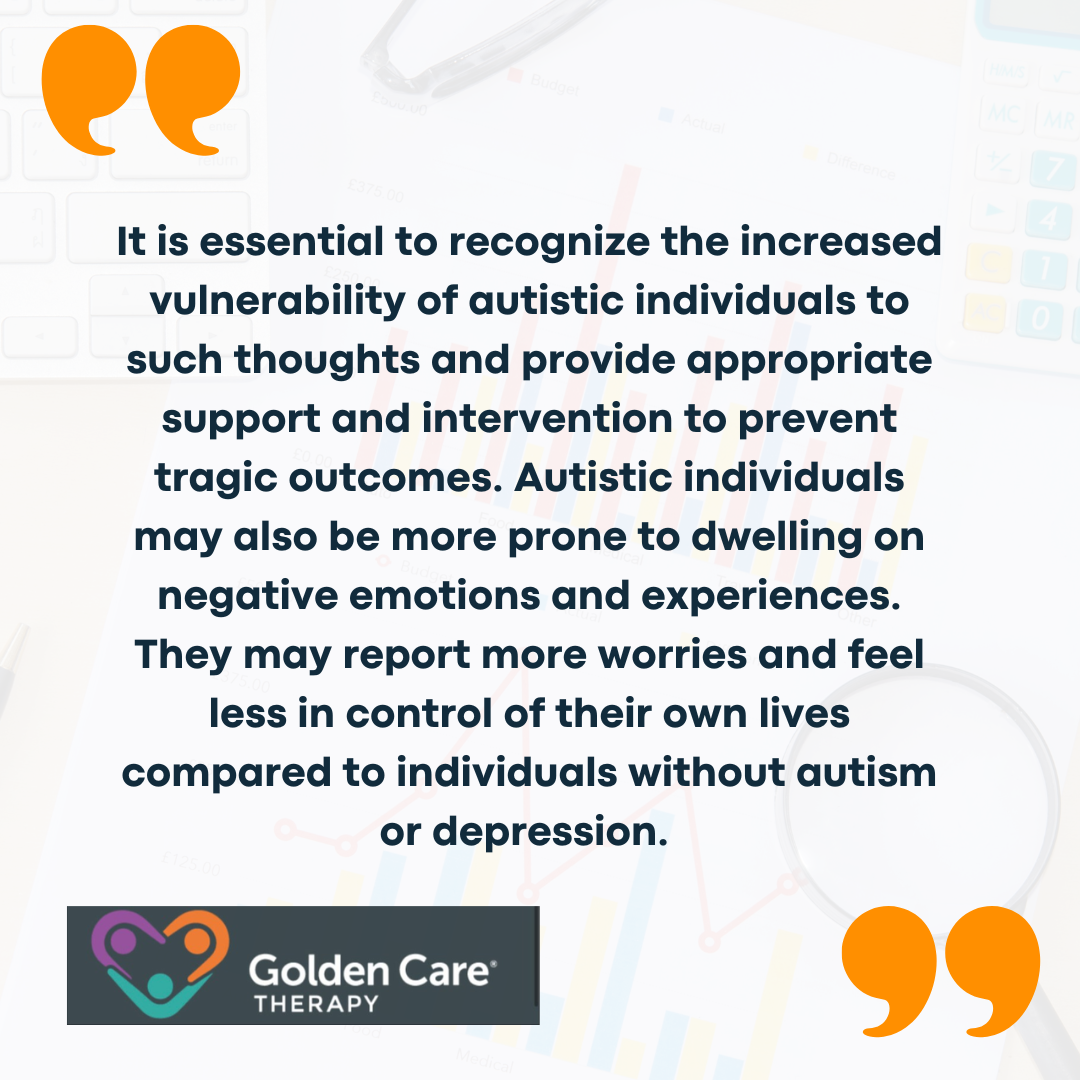Autism and depression are two distinct conditions that can coexist and impact individuals in various ways. However, there seems to be a connection between these two disorders.
Let’s find out what this connection is in this article.

Link Between Autism and Depression
According to research, there is a significant link between autism and depression. Specifically, autistic individuals are four times more likely than neurotypicals to experience depression over the course of their lives. In fact, autistic adults are nine times more likely to consider suicide than non-autistic individuals.
These statistics highlight the importance of addressing mental health concerns in the autistic community.
The presence of alexithymia, a common feature of autism spectrum disorder (ASD) characterized by difficulties in identifying and expressing emotions, may increase the risk of developing depression. Alexithymia can make it challenging for autistic individuals to recognize and communicate their emotional states, making it crucial for caregivers and healthcare providers to be attentive to potential signs of depression.
Impact of Depression on Autistic Individuals
Depression can have a profound impact on the lives of autistic individuals. It can severely impair their independence, coping abilities, daily living skills, social interactions, and communication. The coexistence of autism and depression may exacerbate the challenges already faced by individuals on the spectrum, potentially leading to a decline in overall well-being.
Furthermore, major depression can trigger suicidal thoughts among autistic individuals.

Understanding these unique aspects is crucial for tailoring therapeutic interventions and providing effective support to improve the mental health of autistic individuals.
Factors Contributing to Depression in Autism
Depression is a serious concern for individuals with autism spectrum disorder (ASD). Understanding the factors that contribute to depression in autistic individuals is crucial for providing appropriate support and interventions.
There are several factors that have been identified in research as potential contributors to depression in autism. Let’s look at what these are.

Bullying and Discrimination
Research suggests that autistic children are more likely to be bullied, which can have long-lasting effects on their mental health. The experience of bullying and discrimination can lead to feelings of isolation, low self-esteem, and increased vulnerability to developing depression.
Lack of societal acceptance of autism may also contribute to depression among autistic adults.
Attentional Biases and Repetitive Cognition
Autistic individuals and individuals with depression share similarities in attentional biases, which refer to a tendency to focus on negative emotional material.
Autistic individuals may be more prone to fixate on negative information, such as negative facial expressions or emotionally charged stimuli. This attentional bias, coupled with the repetitive cognition often observed in ASD, may contribute to the development of depression.
Alexithymia and Emotional Identification
Alexithymia, a common feature of autism spectrum disorder, refers to difficulty identifying and describing emotions. Autistic individuals may struggle to understand and communicate their emotional experiences, which can make it challenging to recognize and address depressive symptoms.
There is a significant overlap between autistic individuals and those with alexithymia, and this difficulty in emotional identification may increase the risk of developing depression.

How to Recognize Depression in Autistic Individuals
Depression can present differently in individuals with autism compared to those without the condition. Recognizing the signs and symptoms of depression in autistic children can be challenging due to the overlap between autistic traits and communication differences.
Symptoms of depression in autistic children may manifest differently than in neurotypical individuals. Rather than displaying feelings of sadness, autistic children experiencing depression may show signs of irritability, aggression, or behavioral changes. In some cases, it can even affect the level of empathy in autistic individuals.
They may also exhibit insomnia, restlessness, or a decrease in appetite. It’s important for parents and caregivers to be aware of these atypical symptoms and seek professional support if they suspect their child may be experiencing depression.
The problem is that diagnosing depression in autistic individuals can be challenging due to several factors. Communication differences between autistic and non-autistic individuals can make it difficult for autistic individuals to express their emotions verbally.
Additionally, many individuals with autism show little facial emotion, which does not necessarily indicate depression. This lack of facial expression alignment with internal feelings can further complicate the recognition of depression in individuals with autism, especially when they have limited or no speech to communicate their emotions.
Another challenge is the overlap between autistic traits and symptoms of depression. Some common autistic traits, such as social withdrawal, repetitive behaviors, and restricted interests, can be mistaken for signs of depression.
Due to that, healthcare professionals need to have a comprehensive understanding of both autism and depression to accurately diagnose and provide appropriate support for individuals with autism who may be experiencing depression.
How to Manage Depression in Autism
Psychotherapies play a crucial role in managing depression in autistic individuals. Adapted psychotherapies, such as Cognitive Behavioral Therapy (CBT), are commonly used to address depressive symptoms. CBT focuses on identifying and modifying negative thought patterns and behaviors that contribute to depression.
By challenging negative thinking and replacing it with more positive and adaptive thoughts, CBT can help alleviate depressive symptoms.
Another effective psychotherapy approach is Social Skills Training (SST), which focuses on improving social interactions and communication skills. This can be particularly beneficial for individuals with autism who may struggle with social connections and experience feelings of isolation, which can contribute to depressive symptoms.
In some cases, antidepressant medication may be prescribed. However, it’s important to consider the potential risks and individual circumstances of autistic individuals.
Some autistic individuals, especially children, may be at a greater risk of experiencing side effects like agitation, hyperactivity, and aggression when taking antidepressants. Therefore, health professionals often approach medication cautiously and closely monitor any adverse reactions or interactions.
If you’re seeking specialized ABA therapy in New Jersey, Indiana, Georgia, and New York, Golden Care offers comprehensive services tailored to meet the unique needs of each individual. Contact us to learn more or book a consultation today.
Sources:
https://www.healthline.com/health/autism/autism-and-depression
https://www.autismspeaks.org/expert-opinion/autism-depression
https://www.ncbi.nlm.nih.gov/pmc/articles/PMC7168804
https://www.thetransmitter.org/spectrum/the-deep-emotional-ties-between-depression-and-autism
https://www.autistica.org.uk/what-is-autism/depression-and-autism

